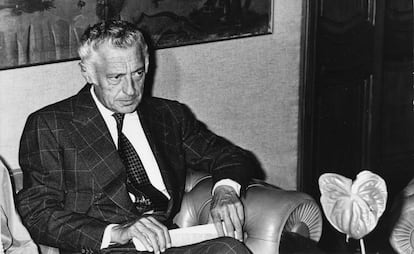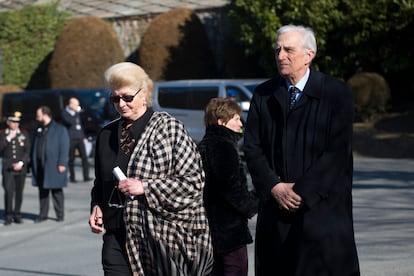The Kennedys of Italy return to the battlefield, this time in a confrontation between mother and son
A legal complaint has been filed by Margherita Agnelli for alleged tax irregularities related to the inheritance left by Gianni Agnelli, her playboy father who reinvented Fiat. Her sons say that they feel ‘grief and pain’ because of her claims

The fragile peace maintained by the Agnelli family, one of the richest clans in Italy, has been blown up in recent days. Once again, the closest thing that the southern European republic has to a royal family is back in the public eye. The war is on again.
At the center of the family’s legal battle — which has lasted two decades and is seasoned with power games, intricate disputes in the courts of Italy and abroad, wild ambitions and hurled accusations — is (as it has been for years) the distribution of the enormous inheritance left by the patriarch Gianni Agnelli, the vain playboy who reinvented the car company Fiat. He died in 2003.
The new chapter in the saga, which corroborates the fact that the wounds never really healed, begins with a legal complaint made by Margherita Agnelli, the daughter of the aristocrat. It’s in relation to her son, John Elkann, heir to the family empire, and alleged tax irregularities in the case of the inheritance left by her mother, Marella Caracciolo, who died in 2019. No further details of the accusation have emerged: it’s only known that the Prosecutor’s Office is investigating Elkann. Clearly, the fuse has been lit once again between the members of one of the most powerful industrial dynasties in the history of Italy.
The eternal war of succession within the Agnelli clan has become a kind of transalpine version of the popular HBO series. Margherita — practically excluded from family affairs since Gianni’s death — has been in conflict for two decades with some of her children: John, Lapo and Ginevra Elkann, born from her first marriage to the heir and journalist Alain Elkann. Among other things, she demands that the distribution of her mother’s estate also take into account her five other children, whom she had with her second husband, the Russian Count Sergius of Pahlen. These children have traditionally remained out of the spotlight.
Following the new complaint, John Elkann’s lawyers have rejected accusations of any tax irregularities and have argued that their client has paid all the taxes he owes. In a statement sent to EL PAÍS, the attorneys have also criticized the judicial actions that Margherita Agnelli has undertaken over the years: “This is a mother who, for more than 20 years, has been persecuting — in all judicial instances, while even making the matters public in the press — her parents and three of her children. [These children] have been the only ones who watched over the care of their grandmother until her last day, with great dedication.”
In response, Margherita Agnelli’s lawyer alleges that her client is only defending herself. “On the same day of Marella Caracciolo’s death, John Elkann — alongside his two siblings [Lapo and Ginevra] — opened legal proceedings in Switzerland against his own mother, even before any dispute had arisen over his grandmother’s inheritance [and] without even any will having been published on that date,” he explains, in a note sent to this newspaper.
In 2003, when Avvocato (the nickname by which everyone knew Gianni Agnell) died, a fierce struggle for inheritance broke out within the family. After a year of arduous negotiations, Margherita Agnelli signed an agreement by which she renounced the shares of the family company, which, at that time, was staring into the abyss. Today, however, the firm has become a prosperous colossus.
In exchange for giving up her shares, Margherita was said to have received a significant sum of money: around $1.3 billion. When this took place, the shares in the company passed from her mother, Marella, to her firstborn, John Elkann, the heir to the empire, who is currently president and CEO of the family business group, Exor. Most of the properties also passed into his name. Years later, however, in 2021, Margherita challenged that agreement, because she considered that the amount she received had been inadequate. She claims that it was too low, when taking into account how the shares rose in value.
John Elkann is now accusing his mother of trying to take advantage of the good economic performance of the family group, today a prosperous conglomerate that, among other brands, includes large stakes in Ferrari and Fiat. He argues that, when Margherita signed the agreement, the firm was going through tough times. He reproaches her for not caring about the future of the company, only to later claim the part of it which she had renounced.
“It’s worth highlighting that Margherita Agnelli — evidently taking into consideration the critical and uncertain fate of the business activities of her son [and his siblings] — decided, in 2004, to monetize her part. [She has then tried] to paradoxically benefit from a new increase in assets derived from the success of Fiat’s relaunch plan, to which she hadn’t contributed at all. As a mother, she should be happy and proud, since her son had been the main architect [of the turnaround],” Elkann’s three lawyers point out. “Margherita challenges everything… even going so far as to breach the signed agreements to not recognize her parents’ will,” they add.

Sources close to Margherita Agnelli tell EL PAÍS that “it’s not that Margherita signed the agreements and then, the next day, began to challenge what she signed.” Rather, three years after the agreement, in 2007, “she discovered that her mother had a fortune in Switzerland of hundreds of millions of euros that didn’t appear in the official accounts. [Also, many of] her father’s assets hadn’t been included in the distribution [when he died].” That year, she filed a lawsuit in court to clarify the full contents of Gianni Agnelli’s estate, but it was dismissed.
The Elkann brothers’ lawyers highlight that, so far, “all of Margherita Agnelli’s legal initiatives haven’t been recognized in any court, neither criminal nor civil.” They point out that the mere fact of being investigated by the judicial authorities — a situation that John Elkann finds himself in today — doesn’t imply any responsibility. Formal charges haven’t been filed. The lawyers emphasize that, in the past — and always in the context of the battle for a larger inheritance — Margherita was also investigated “along with her Swiss lawyer for an extortion attempt,” which was reported by another lawyer who complained of “having been subjected to strong pressure to induce him to make statements that were favorable to her in the case of the succession process. [He was threatened with being subjected] to a complaint for tax evasion.” The Elkann lawyers indicate that this case was subsequently dismissed.
Margherita Agnelli’s entourage tells EL PAÍS that “the judicial route isn’t the most appropriate to resolve family issues,” but “Margherita has been forced to proceed along that path, because she was the first to receive a court summons.” And they insist that, for Margherita, it’s important that all of her children are treated equally in the distribution of the inheritance. “The other children [with the last name Pahlen] shouldn’t have been separated from her; there’s no evidence that Mrs. Marella has specified anything of the sort in her will.”
The Elkann brothers express, through their lawyers, that they’re experiencing “grief and pain” as a result of their mother’s accusations.
Sign up for our weekly newsletter to get more English-language news coverage from EL PAÍS USA Edition
Tu suscripción se está usando en otro dispositivo
¿Quieres añadir otro usuario a tu suscripción?
Si continúas leyendo en este dispositivo, no se podrá leer en el otro.
FlechaTu suscripción se está usando en otro dispositivo y solo puedes acceder a EL PAÍS desde un dispositivo a la vez.
Si quieres compartir tu cuenta, cambia tu suscripción a la modalidad Premium, así podrás añadir otro usuario. Cada uno accederá con su propia cuenta de email, lo que os permitirá personalizar vuestra experiencia en EL PAÍS.
¿Tienes una suscripción de empresa? Accede aquí para contratar más cuentas.
En el caso de no saber quién está usando tu cuenta, te recomendamos cambiar tu contraseña aquí.
Si decides continuar compartiendo tu cuenta, este mensaje se mostrará en tu dispositivo y en el de la otra persona que está usando tu cuenta de forma indefinida, afectando a tu experiencia de lectura. Puedes consultar aquí los términos y condiciones de la suscripción digital.









































